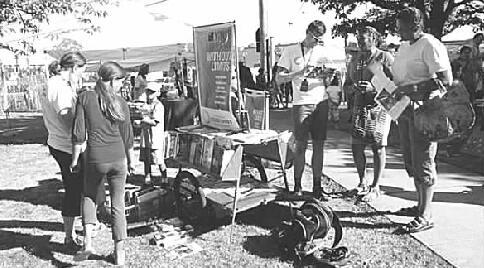自行车上的图书馆
罗跃梅



Books on bikes
The great thing about libraries is that they house all types of books—from mysteries to biographies and dramas—all in one location. The bad thing about libraries is that they house all types of books in one location, and if its a location you cant get to, youre out of luck. Now, mobile library solutions are appearing quickly around the country to bring books to people who need them.
A few years ago, when the Little Free Libraries Movement started, more people of all ages could have access to books. Now, more than 15,000 free book stands can be found around the world, bringing books to unexpected places. But many folks simply cant get to the places where the books are. Bookmobile buses are a good solution, but they can be expensive to fund and to operate.
Books on Bikes programs are popping up(突然出現) in areas where there is a strong bike culture, in some regions like Seattle, or a strong need to bring books to the masses, for example, in San Francisco.
The Seattle Public Librarys Books on Bikes program is made up of three bike/trailer combos(组合) that librarians bring to community events. The trailers are even WiFi enabled so that visitors can sign up for a library card and browse(浏览) the librarys card catalogue on the spot.
“Seattle has a really strong bike culture so we want to tap into that and provide full service library programs but do it in a way that is quick and smart,” librarian Jared Mills said in an interview.
San Franciscos program, called Bibliobicicleta, was launched in 2013 by librarian Alicia Tapia. Her trailer can hold about 100 books and attracts readers of all ages and income levels. Its an independent, donationbased library—like a Little Free Library, but on wheels.
When asked why she would launch a free library on a bike, Tapia answers,“Why not? Bikes are cool, and can go anywhere.”
1. According to the writer, what can be inferred about the traditional libraries?
A. They are popular among the readers.
B. They are large enough to hold any book.
C. They are not very convenient to the readers.
D. They can bring books to people who need them.
2. Which of the following may be the disadvantage of the bookmobile buses?
A. They are full of many travelers.
B. They cost a large amount of money.
C. They hold the limited number of books.
D. They bring books to unexpected places.
3. Why does the writer mention Seattle in the text?
A. To tell us that bikes are popular in it.
B. To tell us that visitors can use free WiFi in it.
C. To tell us that it is the same as the city of San Francisco.
D. To tell us that the library card is useful to the visitors.
4. What does Tapias answer suggest?
A. She enjoys showing off by bike. B. She shows impatience to the readers.
C. She is eager to make the readers happy. D. She thinks libraries on bikes are practical.
house(房屋)和tap(水龍头)是我们生活中随处可见的东西。但你知道house和tap的用法吗?别让它们成为你“最熟悉的陌生人”!快来挑战吧!
Match the words in bold in the following sentences with their proper meanings.
1. The refugees are being housed in temporary accommodation.
2. The collection is currently housed in the British Museum.
3. He turned as someone tapped him on the shoulder.
4. She tapped her feet in time to the music.
5. You can tap into your advisers experience.
6. Murrays phone call to Australia was tapped.
A. To keep something in it
B. To make use of something
C. To listen secretly to someones telephone
D. To provide someone with a place to live in
E. To hit your fingers lightly on something
F. To make a regular pattern of sounds with your fingers or feet
和传统的图书馆相比,新型的自行车图书馆灵活机动且成本低廉,对读者也很有吸引力。

